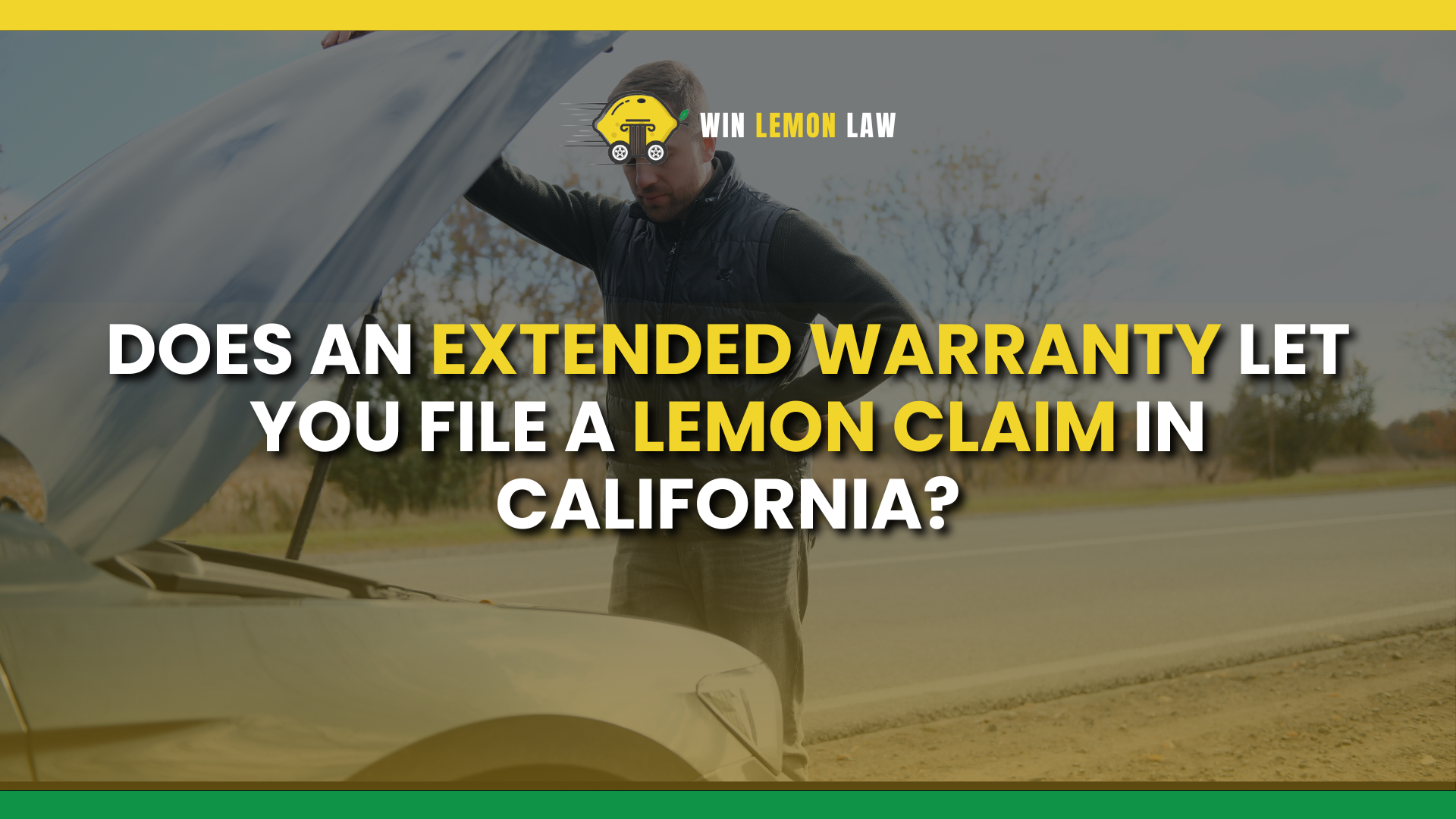You bought a car you thought you could rely on. Maybe it seemed fine at first, but soon the same problem kept coming back—engine trouble, electrical issues, transmission failures—until you realized this wasn’t just bad luck. It was a lemon.
Now, like many California car owners, you’re wondering if your extended warranty could help. After all, you paid for that extra coverage to protect yourself from expensive repairs. But here’s the thing: while extended warranties can be useful in some situations, they don’t automatically give you rights under California’s Lemon Law.
That doesn’t mean you’re out of options. In fact, understanding how extended warranties interact with Lemon Law protections can make the difference between getting stuck with a defective car and getting the justice you deserve. Many people don’t realize that the timeline of the defect, the number of repairs, and the type of warranty all come into play when determining your legal rights.
The reality is this: the longer you wait to understand your options, the more complicated things can get. Some car owners miss their chance at compensation simply because they didn’t get advice early enough. That’s why learning how extended warranties fit into California’s consumer protection laws is the first step toward turning your frustrating situation into a resolution that actually benefits you.
How California’s Lemon Law Really Works
California’s Lemon Law, officially called the Song-Beverly Consumer Warranty Act, was designed to protect consumers from defective vehicles. If a car has a serious issue that impacts its use, value, or safety—and the manufacturer or dealer can’t fix it after a reasonable number of attempts—you may be entitled to a refund or a replacement vehicle.
But here’s the key point: Lemon Law protections only apply if the problem occurs during the original manufacturer’s warranty period. Once that coverage ends, your legal options under California’s Lemon Law become much narrower, even if you purchased extended protection. Many people are surprised to learn this, assuming that any warranty will automatically give them the same rights under the law.
There are exceptions, and sometimes the details matter more than people realize. A defect that began under the original warranty but continued after it expired might still give you a case, especially if the manufacturer failed to fix it despite multiple opportunities. Attorneys who specialize in Lemon Law know how to use repair records and warranty timelines to prove when the problem began and why you still deserve protection.
California’s Lemon Law is one of the strongest consumer protection laws in the country, but that doesn’t mean car manufacturers make it easy to use. They often downplay problems, delay repairs, or insist the defect doesn’t meet the legal standard. That’s why getting professional help early can make all the difference when it comes to getting your money back or a new vehicle.
What an Extended Warranty Actually Covers
An extended warranty—sometimes called a vehicle service contract—is an optional plan you can buy to cover repairs after the factory warranty expires. Some are offered by the manufacturer itself; others come from third-party companies.
Manufacturer-backed warranties are usually more dependable. They tend to use authorized repair shops, follow factory repair procedures, and sometimes offer better customer service if problems arise. Third-party warranties can be less predictable, with restrictions on where you can take your car, what parts are covered, or how many claims you can file. These differences can become critical when you’re already dealing with repeated breakdowns and unreliable repairs.
What most people don’t realize is that extended warranties are essentially repair agreements, not legal protections. They cover costs but don’t force the manufacturer to buy back or replace your vehicle the way Lemon Law might. That’s why a lot of car owners get frustrated when they find out their extended coverage doesn’t give them the same rights as the original warranty.
That being said, the type of warranty you have still matters. A manufacturer-backed plan may make the automaker more willing to negotiate if problems persist, while a third-party plan might require a completely different legal approach. Understanding which one you have can save you time, stress, and missed opportunities for compensation.
When an Extended Warranty Might Help Your Case

Even though an extended warranty doesn’t automatically qualify you for Lemon Law protections, it can sometimes strengthen your position if you play your cards right.
Let’s say your car had a defect during the factory warranty period, but the issue kept coming back after that coverage ended. If you used your extended warranty for more repair attempts, those records could show the manufacturer had multiple chances to fix the problem and failed. We’ve seen cases where this paper trail made all the difference in proving the vehicle qualified as a lemon.
Sometimes manufacturers even offer “goodwill” buybacks when the defect started under their original coverage and continued despite extra repair attempts. It’s not guaranteed—but keeping detailed records from both warranty periods gives your attorney more ammunition to fight for compensation, a replacement, or a buyback.
We’ve also seen situations where the extended warranty repairs revealed the full scope of the defect. For example, multiple failed transmission replacements under extended coverage can highlight the seriousness of the problem, making it harder for the manufacturer to argue it isn’t a lemon. The key is connecting the dots between both warranty periods to show the defect was never fixed despite repeated opportunities.
Why Repair Records Matter More Than You Think
One of the biggest mistakes car owners make is failing to keep detailed records of every repair visit. Each invoice, work order, and email exchange builds a timeline showing how often you tried to get the defect fixed—and how often the dealer or manufacturer failed.
If your case ends up in court or negotiations, these records become powerful evidence. They can prove the problem started under the original warranty, continued into the extended coverage period, and was never properly resolved. The stronger your paper trail, the harder it is for the manufacturer to argue your case doesn’t qualify.
This documentation can include everything from service orders to text messages with dealership staff. Even small details—like how long the car was in the shop—can support your case by showing the defect disrupted your life in real ways.
We often tell clients that repair records are like puzzle pieces. Alone, each visit may not seem significant. But when you put them together, they create a clear picture of a defective vehicle that qualifies for legal protection.
Your Options With Only an Extended Warranty

If your car problems began after the factory warranty expired and you only have extended coverage, California Lemon Law may not apply. But that doesn’t mean you have no rights at all.
Other consumer protection laws, like the federal Magnuson-Moss Warranty Act, can sometimes help if the company refuses to honor your warranty contract. And if you have a manufacturer-backed plan, negotiating directly with the automaker might lead to a settlement or buyback outside the Lemon Law framework—especially if the defect is severe or safety-related.
For third-party service contracts, the fine print matters. If the company breaks its own agreement by refusing to cover legitimate repairs, you might have a breach of contract claim. Either way, an experienced attorney can review your situation and determine the best way forward.
Sometimes manufacturers also respond to pressure from attorneys even when Lemon Law doesn’t directly apply. If your car has been in the shop over and over again, a legal demand letter may be enough to get you compensation or repairs the company previously denied.
How Manufacturers Try to Avoid Lemon Law Claims
Automakers know Lemon Law claims cost them money—and many will do whatever they can to limit their liability. We’ve seen dealerships tell customers their car doesn’t qualify because the problem isn’t “serious enough,” even when it clearly impacts safety. Others will stretch out repairs, hoping the warranty expires before the issue is fully addressed.
Some manufacturers also argue that each repair attempt was for a “different” issue, even when the symptoms were obviously the same. These tactics are designed to confuse car owners and discourage them from pursuing legal action.
Another common strategy is offering temporary “fixes” instead of real repairs, so the problem keeps coming back after the warranty period ends. By the time you realize nothing was permanently fixed, they claim it’s too late to file a Lemon Law case.
That’s why having a skilled Lemon Law attorney matters. We know the games manufacturers play—and we know how to shut them down. Our team steps in to protect your rights, gather the right evidence, and hold automakers accountable when they try to dodge responsibility.
Protect Yourself Before You Buy Extended Coverage
If you’re thinking about buying an extended warranty, make sure you read every word before signing. Some people assume they’re getting the same protection as the original warranty—only to find out later that major repairs aren’t covered, claims require high deductibles, or they can only use certain repair shops hours away from home.
Manufacturer-backed plans usually offer the most reliable coverage. Third-party contracts can vary widely, so check reviews, complaints, and refund policies before committing. A little research now can save you huge headaches later.
It’s also worth comparing the cost of the extended warranty to the potential repairs your car is likely to need. Some plans exclude common problems for certain makes and models, leaving you with coverage gaps you didn’t expect.
If you’re buying a used car, find out whether the manufacturer’s original warranty is still in effect before paying for extra coverage. In some cases, you may not even need an extended warranty right away.
Talk to a California Lemon Law Attorney
Extended warranties can be confusing—and car manufacturers know it. They count on that confusion to avoid paying claims or replacing defective vehicles. But you don’t have to figure this out alone.
At Win Lemon Law, we help California drivers understand their rights, even when things get complicated with overlapping warranties and persistent defects. Our attorneys review your repair history, warranty coverage, and timeline to see if you qualify for Lemon Law protection or other consumer remedies.
You don’t pay us a penny unless we win your case. And if you do qualify for a Lemon Law claim, the manufacturer—not you—covers all legal fees. That means you can fight back without risking anything financially.
Every day you wait is another day stuck with a car you can’t rely on. We’ve helped thousands of people across Los Angeles and all of California get buybacks, replacements, or settlements for vehicles they thought they were stuck with forever.
If you’re dealing with repeated repairs, safety concerns, or a car that simply won’t stay fixed, contact Win Lemon Law today for a free consultation. We’ll help you understand your options, fight for your rights, and work to get you back on the road in a vehicle you can actually depend on.

